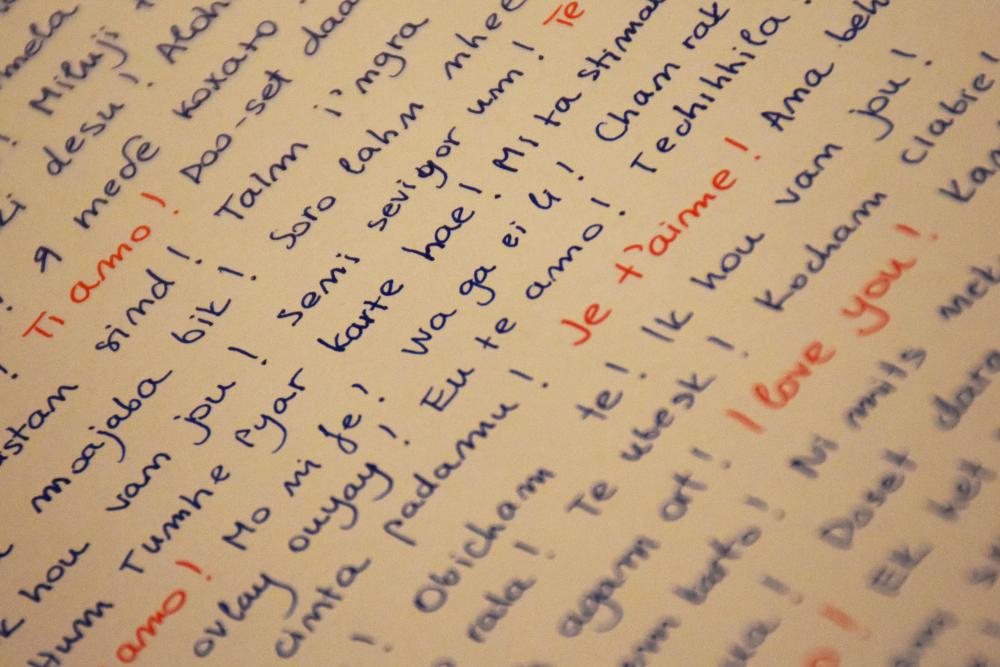This is a subject where my passion meets my profession. As a linguist, a foreign language teacher, and a traveler, I have established some common traveling situations – a must-know vocabulary for travelers and a few rules to follow when learning and speaking a foreign language. We hope you’ll find it useful! 🙂
TO LEARN OR NOT TO LEARN?
English is widely spoken all around the globe and in fancy hotels or resorts finding English-speaking staff shouldn’t be a problem. However, if you decide for a less organized, less conventional, more adventurous type of honeymoon you will easily come across people who don’t speak English or any other foreign language for that matter. Nowadays you can rely on dictionaries, translators, pocket language guides and numerous excellent language apps to save the day, but unfortunately, all this is still not as practical as we would want it to be. Not to mention that sometimes you might leave the books in your room or your phone battery might die. In that case, everything depends on you and your knowledge. That’s why we prefer to do it the old way and actually learn a few basic words and sentences. It may sound complicated, but if you do it the right way you could end up learning fast and having a lot of fun in the process! 🙂
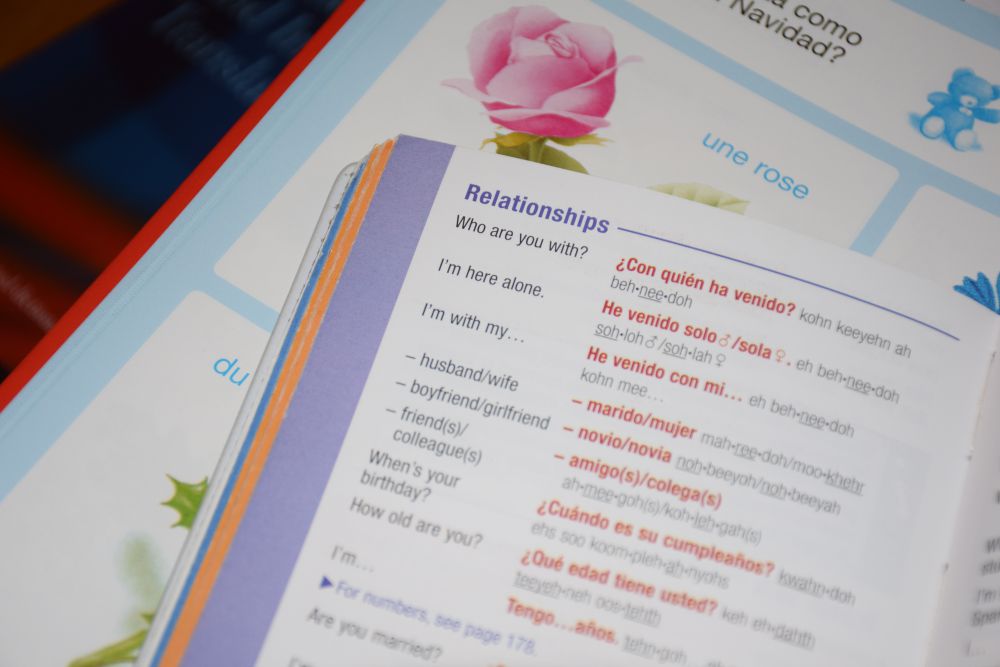
GOLDEN RULES WHEN LEARNING AND SPEAKING A FOREIGN LANGUAGE
If you do choose to learn some basic words and phrases, here are the common steps: Expand your vocabulary, practice speaking, pronunciation, listening comprehension and if necessary learn how to read and write. Here are some tips on how to make the learning process easier:
• Choose your vocabulary
Many people believe that speaking a new language means knowing all the rules and all the words. It’s a common misconception that sadly discourages people from learning foreign languages. Well, here is the truth: it’s impossible to learn all the words. In fact, we can’t even remember all the words in our mother tongues. The key, when learning a new language is to memorize the most frequent words. Think about the possible situations you could find yourself in (e.g. airport, hotel check-in, shopping, etc.) and focus on those words and phrases. The goal is to be able to communicate. That’s it!
• Rely on cognate words from the languages you already speak
As a linguist, I find it fascinating how lots of very different languages have so many similar words. For us, travelers this phenomenon may come in handy because if we pay attention and associate unknown words with familiar ones from other languages it can help us guess the right meaning. Certainly, we can find more cognate words between Indo-European languages than, for example, between English and Chinese, but even in this case, it is possible to find some rare similarities. Some of the words with similar pronunciation in many languages are mother, father, brother, coffee, tea, night, milk, water, angel, rum, atom, comet, radio, etc.

Let’s take a closer look at the word Mother (Mama, Mom): in Italian it’s: Madre, Mamma; in Spanish: Madre, Mamá; in French: Mère, Maman; in Russian: Мать, Мама; in Slovene: Mati, Mama; in Croatian: Majka, Mama; in Czech: Matka, Máma; in German: Mutter, Mama; in Dutch: Moeder, Mama; in Hindi: Mata, Maa; in Chinese: Māma (妈妈/媽媽); in Indonesian: Ma, Mama; etc. So if you’re somewhere in Romania and hear something like ‘mama’ it’s pretty safe to assume that somebody is calling their mother.
• Take free online language courses
Conventional language courses are a good idea for all those who are unable to motivate themselves to learn a new language on their own, for people who need an extra push. But if you manage to find motivation, if you promise yourselves to stay focused, consistent and disciplined on your own, then taking free online courses can be a better choice! Not only are they free, but you also save a lot of your precious time by staying in the comfort of your own home. Twenty, maybe even ten years ago high-quality online courses were not an option, but in our times the internet provides so many different, truly excellent courses, that it would be a sin not to take advantage of them. Here are a few of the most popular options:
Duolingo, available online and as a smartphone app.
Babbel, available online and as a mobile app.
Anki, a software program, and smartphone app.
Tips on how to motivate yourselves:
– Schedule your study time.
– Partner up.
– Remove possible distractions.
– Create a pleasant study environment.
– Provide yourselves with water and snacks, which will make the process a bit more comfortable.
– Set yourselves study goals
– Make sure to reward yourselves afterward
– Keep your mind on the ultimate goal (on how you will soon be able to order a delicious cocktail for yourself and your significant half in Spanish 😉 ).
• Come up with theories and explanations on where a foreign word gets its name from
Invent your own interesting, funny stories behind the names of different words and associate those foreign expressions with familiar ones. This trick is especially effective when learning new letters or characters. By letting your imagination run wild you can have a lot of fun. If you don’t feel like inventing your own explanations, you can use Memrise, a program, which will do it for you.
• Practice with a native speaker
Another great advantage of the Internet are the many language exchange websites, where you can meet native speakers from all around the world for online conversations and instructions. Some sites provide free services, where you and your language partner teach each other, on others you can pay for a tutor. Conversations usually take place via Skype or another video conferencing program. Google your best option.
• Surround yourself with your target language
There is an easy and very effective everyday trick on how to learn new words quickly and almost subconsciously: immerse yourself in the language. No matter what it is you do in your free time, whether it’s listening to music, watching TV shows and movies, reading magazines or children’s books or following the media – do it in the language you are trying to learn. You can even switch your cell phone, e-mail, social media and other accounts to your target language. This way you will start to feel the language and eventually learn a lot without even noticing. Have fun!

• Pick a ‘target language day’
As we already mentioned, partnering up is a great way to learn a new language. Your language partner can be anyone – your best friend, your co-worker, your mother or your brother, but since you’re preparing for your honeymoon, who better to choose than your (future) spouse. Having a partner brings lots of benefits. It provides support, motivation and perhaps a bit of rivalry, which only gives you the extra push, but most of all it gives you a companion, who will share this interesting challenge with you. Picking a day when you’re only allowed to talk to each other in the language you are learning is actually a fun game. At the beginning, you will probably stutter and make many mistakes and if you keep a healthy attitude about it a good laughter is guaranteed. 😉
• Use your time wisely
While you’re waiting for a bus, applying makeup or cooking dinner you can think or talk to yourself in your target language. You can pretend you’re on the phone or something and even do it in public. What you think/talk about is completely up to you – use your imagination. This way you will have the chance to practice the language without the pressure of the audience, so you can relax and fully concentrate. It may be just five or fifteen minutes a day, but those minutes add up and pretty soon you’ll be talking about hours. And while we’re at it – minutes and hours are actually the units of time you should count. Not months like people often tend to do. Add individual hours and you will see that you can learn a new language a lot faster than you expected.
• Consistency is the key
Learn and repeat. Don’t put your practice aside for too long, cause you will start to forget. Consistency is the key to success. Besides, by practicing every day you will build up your confidence, which is very important.
• Work on your pronunciation, yet embrace your accent
You can work on your pronunciation by listening carefully to a native speaker and trying to repeat the exact same sounds. Since phonetics are hard to master, you shouldn’t lose your time on chasing perfection. Instead, you should embrace your accent and keep in mind that it only proves you speak another language!
• Don’t worry about grammar
Focusing on grammar will just slow you down, so don’t bother. There is no need to trouble yourself with countless rules and exceptions. Again – the key is communication! Besides, if you memorize entire phrases, as is usual, your grammar should be correct anyway.

• Study their body language as well
Since we won’t be learning a new language to perfection just for our honeymoon, we will encounter words and phrases we are not familiar with. When that happens make sure to observe people’s body language, posture, mind the context, use gestures and you’ll be fine!
When speaking a foreign language, keep in mind:
• Relax. Be confident.
You have nothing to lose. You can only gain respect for trying and for actually knowing a few words in another language.
• Don’t chase perfection.
Always remember that you’re not trying to win a prize. Distinguish between being fluent and accurate- the goal is to communicate, not to master thousands of rules and memorize countless words.
• Begin slowly.
Buy chewing gums at a small store and say ‘hello’. If they ask you something at the counter they’re probably offering a bag or asking if you have a discount card, so just say ‘no’. Afterward, give them the right amount of money and say ‘goodbye’. It’s the most basic conversation you could have, but seeing how well you did will give you more confidence.
• Alcohol
Don’t get us wrong. We’re not promoting alcoholism or anything like it. Not at all! But a glass of wine or a small beer will definitely give you a boost and to talk in a foreign language will suddenly become a bit easier.
• Joke about it.
Joking about your poor knowledge will ease the unnecessary tension you may feel. It’s always good to be able to laugh at your own expense.
• Learn from your mistakes.
Every mistake is an opportunity to learn something new. It seems to us that you will always remember best the words you so miserably mispronounced.
• Carry a dictionary, download the right apps.
It may be time-consuming, but it can also be really helpful!
• Use gestures.
In case everything else fails you can try using hand gestures. And believe us – even confused waving and plane charades work! We have seen it hundreds of times. 😉
• Buy a communication T-shirt for travelers.
To simplify things buy a cool communication T-shirt (regular, for women, with long sleeves, or another product) with 40 international traveling icons, which will help you communicate when words and hand gestures don’t suffice. 😉
THE MUST-KNOW VOCABULARY FOR TRAVELERS
a) Basic expressions (greetings, introductions, and courtesy phrases)
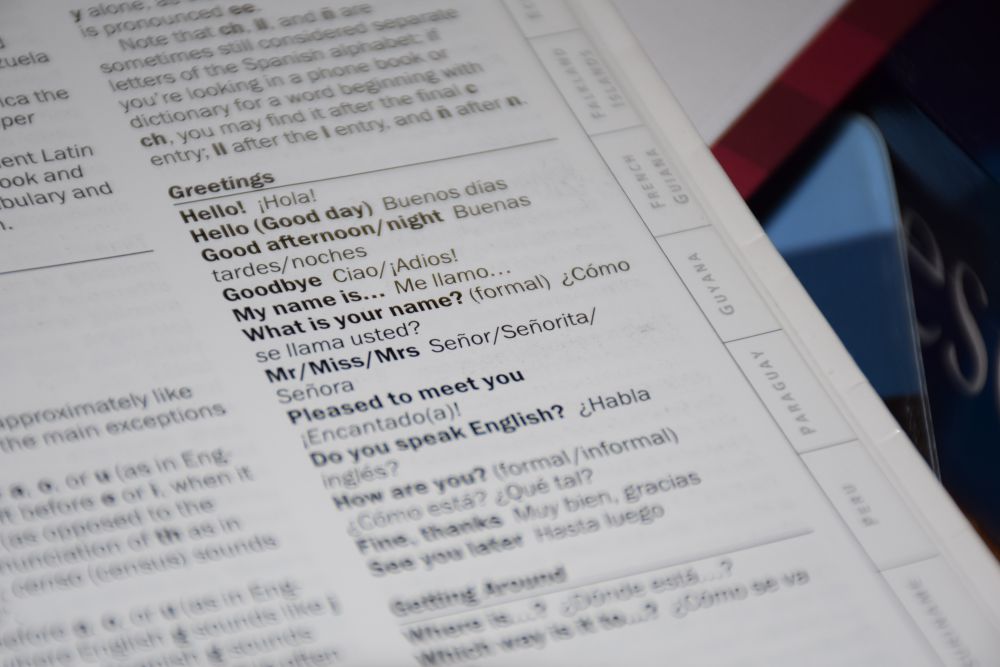
– Hello!
– Goodbye!
– Good morning! Good afternoon! Good evening! Good night!
– Please!
– Thank you!
– You’re welcome!
– Yes/no!
– May I?
– Excuse me!
– Welcome!
– What’s your name? My name is…
– Who are you? I am / We are… (You can ask about a person’s name, profession, nationality or role in the current situation (e.g. a tourist, a student, her husband, his wife, honeymooners, newlyweds…))
– Who is this? This is…(my husband, my wife)
– What is this? This is…
– How are you? Great/good/bad, thank you. You?
– Nice to meet you! Likewise!
– Okay, of course, fine…
– Good luck!
– Have a nice day!
– See you soon!
b) Letters, numbers and other useful words
If necessary, learn how to read. If you’ll be traveling to a country where they don’t use the same alphabet, it might be a good idea to learn it. Otherwise, you won’t be able to read, let alone understand public signs.

Learning numbers can also be very useful. You will have to buy 2 tickets, order 2 pizzas, pay $67, exchange €350, catch the bus at 7.30pm, tell someone you are 28 years old, etc.
It might come in handy to learn how to say/name…
– I/me, you, he, she, it, we, you, they
– Where, when, how, why, what, who, how much?
– Basic countries (where you come from, where are you going)
– Basic professions (your own)
– Basic family members (husband, wife, mother, father, son, daughter, brother, sister)
– Basic colors
– Basic animals
– Days, months, seasons, weather conditions
– Date, time
– Nouns: Baggage, documents, money, credit card, wallet, passport, camera, photography, language, dictionary, word, cell phone, the internet, computer.
– Verbs: Be, call, have, buy, book, rent, travel, eat, sleep, walk, talk, speak, listen, write, read, work, rest, watch, see, visit, play, love.
c) Directions and transportation
– Excuse me, where is…?
– A cheap accommodation, a nice hotel, a good restaurant, a bar with free Wi-Fi.
– The toilet, bathroom, store, bank, ATM, public phone, museum, police station, hospital, market, cinema, theater, post office, park, forest, beach, sea, cruise ship, port; spa, sauna, gym, room number…
– Airport, bus station, metro, train station, taxi stand, rental car office, gas station.
– Baggage claim, customs, check-in, gate number…, duty-free shop, ticket booth, waiting room.
– Entrance, exit
– Here, there, (turn) left, right, (go) straight ahead, that way, far, near.
– Thank you. You’re welcome.
– Transportation, airplane, bus, train, taxi, car, metro.
– A one-way/return ticket to…(two…tickets)
– How much does a ticket to…cost?
– When does the train, bus,…leave?
– Take me to…(this address), please!
– Stop here, please!
– Where is the nearest…?
– I’m lost.
– I’m looking for…

d) Accommodation
– Welcome!
– We want to make a reservation.
– Do you have a room available?
– For one night, two, three, four…nights.
– I made a reservation.
– My surname is…
– Your passport, please?
– Here are my passport and our reservation confirmation.
– Sign here, please!
– When should I pay?
– How would you like to pay?
– With cash/bank card.
– Here is your key!
– Have a pleasant stay!
– Your room number is…
– Where is room number…?
– It’s on the first, second, third…floor.
– Do you have Wi-Fi?
– Could you give us the password, please?
– Is there an air-conditioner, TV, fridge, phone, bathroom, shower in the room?
– At what time is check out?
– Is breakfast included?
– At what time is breakfast/dinner served?
– Where is the sauna, Jacuzzi, indoor and outdoor pool, bar, restaurant, elevator, parking lot, lobby?
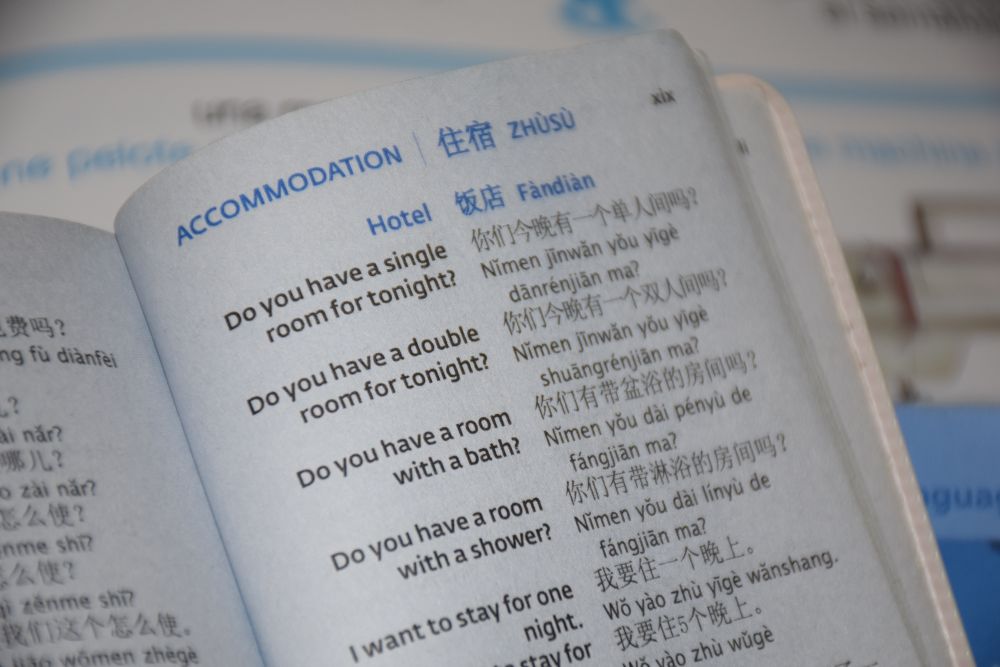
e) Dining
– A table for two, please!
– The menu, please!
– We would like to drink/eat something.
– What would you like to drink/eat?
– Water, champagne, wine, beer, coffee (with milk), hot chocolate, (green, herbal, fruit) tea, (orange, apple) juice, lemonade, please!
– Meat, chicken, turkey, pork, beef, pasta, fish, pizza, soup, eggs, cheese, hamburger, please!
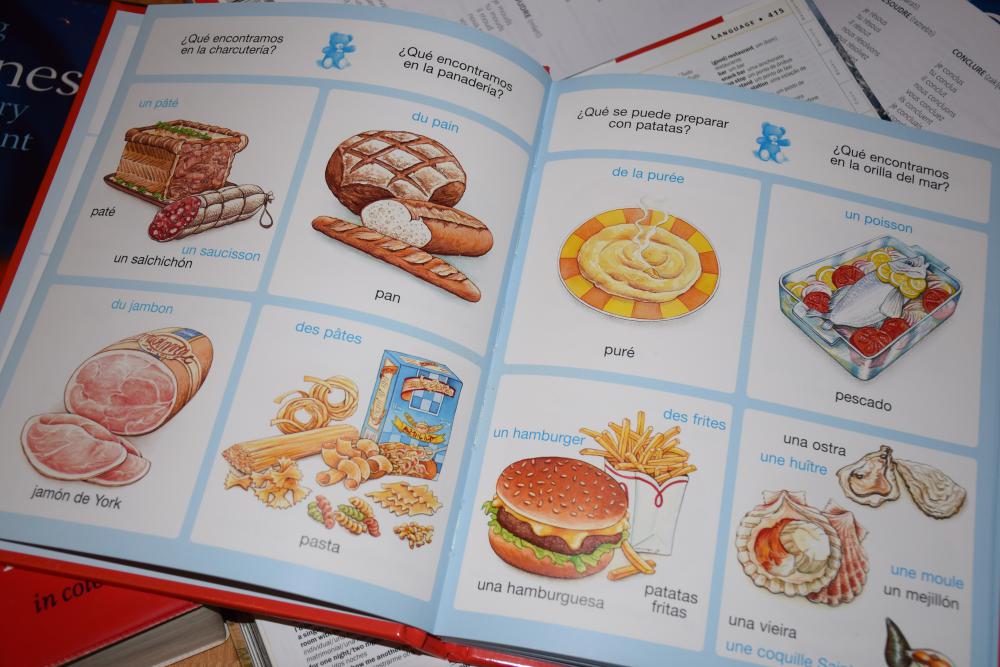
– What do you recommend?
– What is the house specialty?
– Do you have any vegetarian dishes?
– Do you have any vegan dishes?
– Anything else?
– No, thank you. / Yes, please.
– Rice, potatoes, noodles, salad, vegetables, please.
– Not too spicy, please!
– Could you bring us bread, please?
– Is that all?
– That’s all, thank you!
– Bon appetit!
– Cheers!
– Another, please!
– The dessert menu, please!
– Cake, pie, ice cream, fruit salad, cookies, please!
– Appetizers, main course, side dish, dessert.
– Breakfast, brunch, lunch, snack, dinner.
– Napkin, fork, spoon, knife, glass, cup, plate.
– Salt, pepper, sugar, honey, spices.
– Salty, sour, sweet, spicy.
– It was delicious!
– Check, please!
– Tip, cash, credit card.
– I want to order room service.
f) Shopping
– Where can I buy groceries, bread, milk, water, fruits, vegetables, clothes, shoes, a ticket, a map, cosmetics, condoms, batteries, jeans, a dress, a shirt, a skirt, a suit, lingerie, sandals, swimwear, beach towels, sunglasses, etc.?
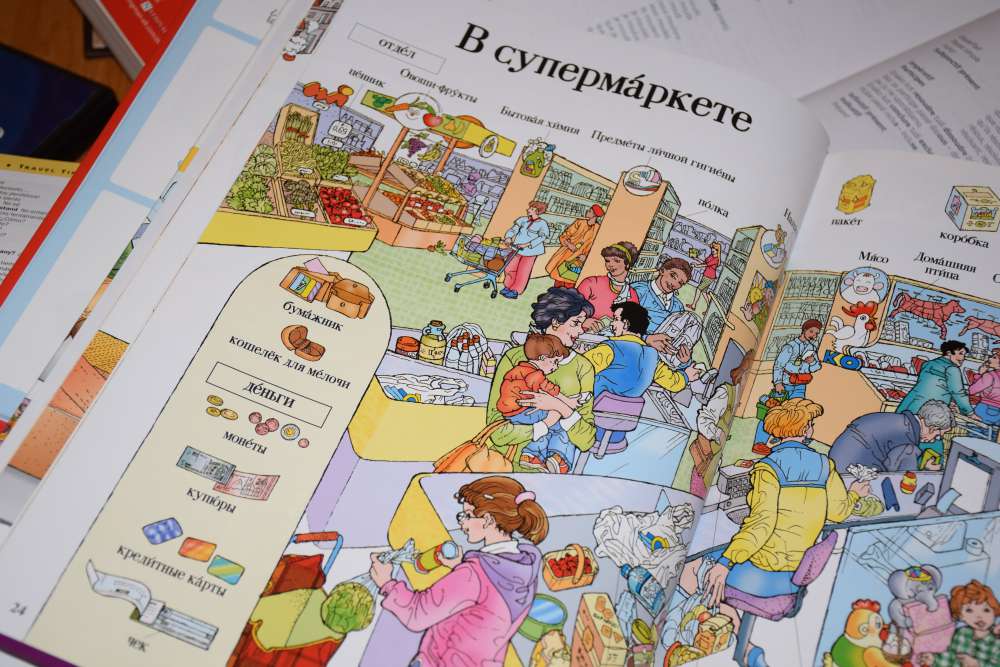
– How may I help you?
– I’m just looking, thank you.
– Do you have any…?
– I need a white shirt, size…
– Can I try it on?
– Where is the fitting room?
– Do you have a larger/smaller size?
– Do you have it in black?
– How much does this/it cost?
– How would you like to pay?
– With cash/bank card.
g) Other common phrases
– Do you speak English?
– I don’t speak Spanish, Italian, Portuguese, French, Russian, German, Dutch, Japanese, Mandarin, Hindi, Arabic, etc. (very well).
– How do you say…in Spanish, Italian, Portuguese, French, Russian, German, etc.
– Do you understand? I understand / I don’t understand!
– I beg your pardon?
– I don’t know.
– I am sorry.
– Speak slowly, please!
– Repeat, please!
– Help, please!
– Call the police!
– Stop!
– Where is the bathroom / the toilet?
– Do you have WI-FI?
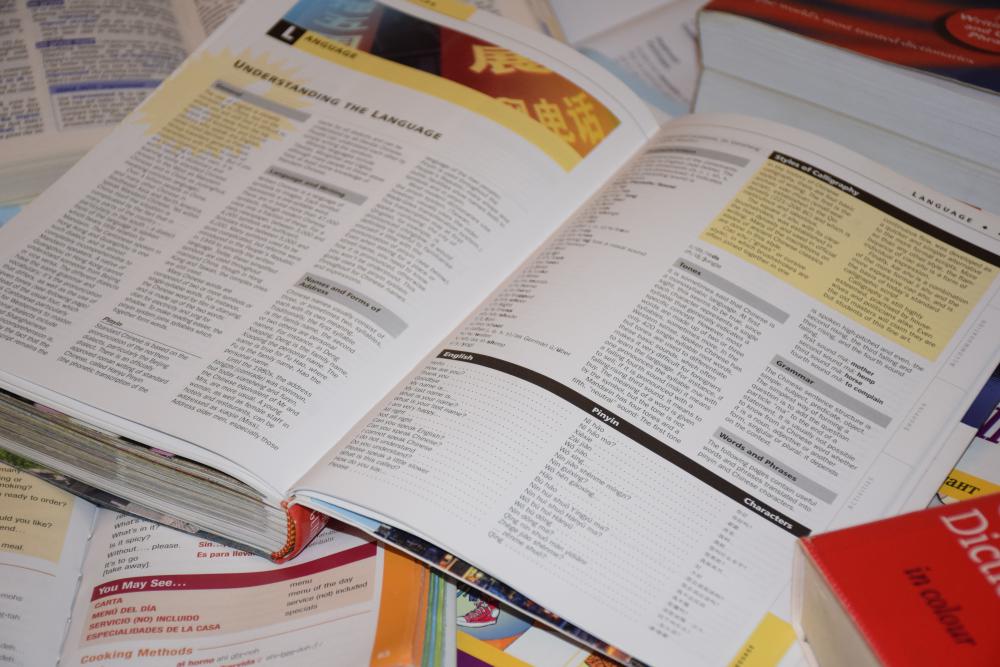
h) Honeymoon expressions
– We’re on our honeymoon.
– Do you have any special offers for honeymooners?
– We’re newlyweds.
– Honeymoon packages, upgrades, discounts.
– Romantic activities, romantic dinner, romantic restaurant, romantic music, couple’s massage.
– Private room, privacy, (dinner, trip, etc.) for two.
– Candles, flowers, florist’s, balloons.
– Mister and misses, husband and wife.
– I love you. ♥
